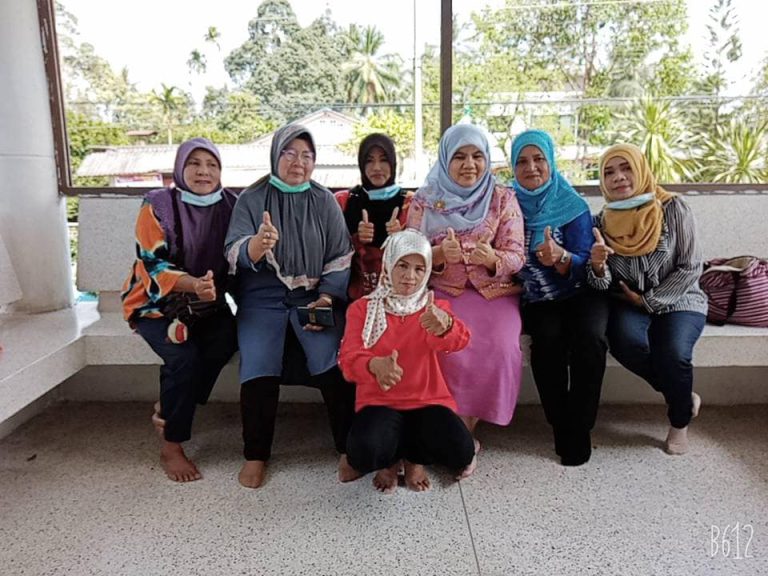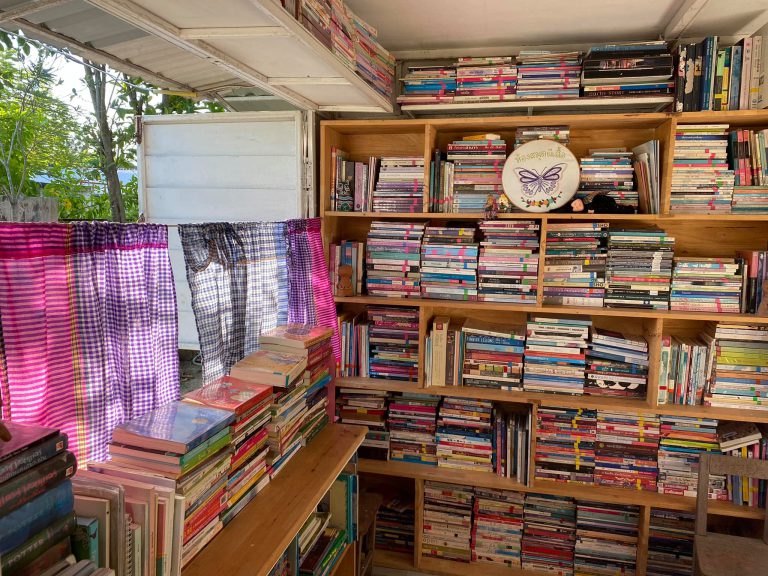Story: Kittin Likitparinya
Though death is generally conceived of as emptiness, the immateriality of death sometimes intertwines with the
The “Healthy Living Day” conference held on the 2nd of November, 2019 was an important milestone for palliative care in Thailand. Not only did it raise awareness of “peaceful death” among wider circles of Thai society through insightful activities, but notably, two of the conference’s sponsors were the Cheevamitr Social Enterprise and the Allianz Ayudhya Assurance Insurance Company.
The former is a significant driving force in the journey to bring the “peaceful death” movement to Thai society.
The latter is a private company deeply interwoven with the Thai healthcare system.
Insurance Companies and Palliative Care
On top of cultivating an awareness of “peaceful death”, another of the organizers’ objectives was to advertise Allianz Ayudhya’s current insurance plan, which provides coverage for all healthcare services whether a customer opts for conventional treatment or palliative care. Customers are insured for their entire course of treatment, including the employment of home health aides, and receive access to a 24 hour helpline staffed by healthcare professionals (for more information, please contact a company representative).
“Lucky to be able to choose” was a recurring motif of the conference. The phrase adorns the shirts worn by most of the staff members and was prominently displayed on the side of the conference screen to underscore its importance to participants. The phrase refers to a new model of insurance that gives consumers the ability to choose even in their last stage of life.
What Does The Entry of Private Companies into Palliative Care Mean For Us?
The entry of private companies underwrites the next stage of development for the palliative care community. It indicates greater support, such as job opportunities for public health professionals and a wider array of choices for patients in palliative care and their families (as underscored at the conference, where “lucky to be able to choose” was inscribed wherever one looked), for an already tightly-woven community. The collaboration also provides another source of revenue for insurance companies, and thus benefits everyone involved.
What Were Some of The Activities at the Conference?
The “Healthy Living Day” conference was held at the Scala Movie Theatre on the 2nd of November 2019 from 10:00am to 6:00pm. During the first two hours (10:00-12:00), there was an assortment of events, such as an exhibition of artwork on the theme “peaceful death” and a booth on the preparation of a “living will”. There were also three workshops: “Caring for Patients that are Unable to Communicate” organised by “I see u Contemplative Care”, “How to Listen to Patients with Depression” by SMARITANS, and “Drafting a Living Will” by the Karunrak Centre.
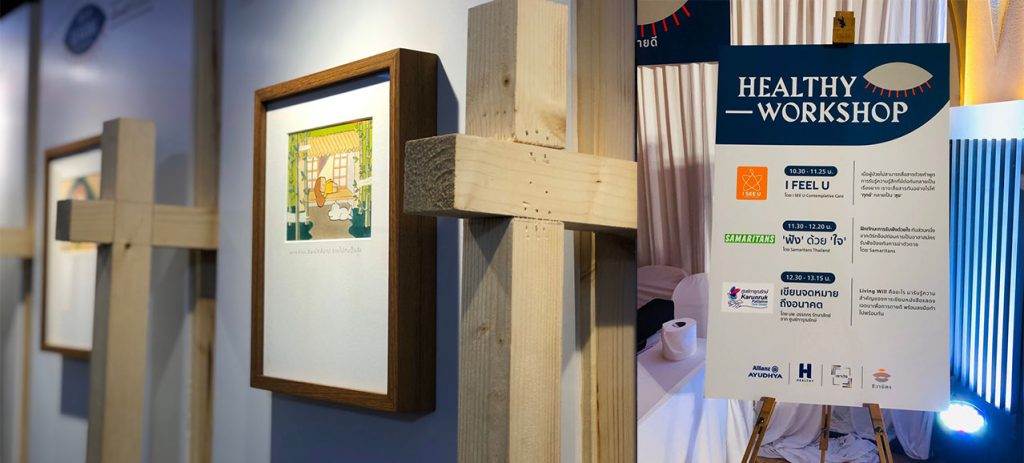
In the afternoon (1:30pm onwards), participants were invited to attend a seminar in the Scala Theatre, which began with a screening of an advertisement for purchasing insurance that “takes care of everything” and highlights the key phrase of the conference, “lucky to be able to choose”. Following that was a talk in two parts, the first titled “Living Comfortably” and the second, “Dying Peacefully”. During the “Living Comfortably” section, participants shared their perspectives on ways of living and being that were deeply rooted in their personal experiences.
Highlights from the “Living Comfortably” Section
Toffy Bradshaw, host of THE STANDARD’s “I Hate My Job” podcast
Mr. Bradshaw’s experiences affirmed to the audience members that the trials of working in an office not only give rise to office syndrome, but that the toxicity of office culture can distort us into the very person we used to hate.
He concludes his time onstage with advice on ways we can change and better love ourselves.“Don’t allow yourself to become the person you once hated,” he urges.
Madmee Pimon Mokkhasmit, founder of CU.Fitgirl Facebook Page
Ms. Mokkhasmit’s obsession with losing weight and self-discipline grew into a binge eating disorder (BED), a condition of cycles of overeating and vomiting, to the detriment of her mental health. The disorder began to eat away at the rest of her life, and she became depressed and heavily addicted to cigarettes.
Once she decided to seek help, Ms. Mokkhasmit’s secret to maintaining balance in her life, is to practice self-control for only 70% of the time, and allow herself pleasure for the rest of the 30%.
She wraps up with a last reminder: “Ultimately, nothing in life is perfect and it is that very imperfection that allows us to keep moving forward.”
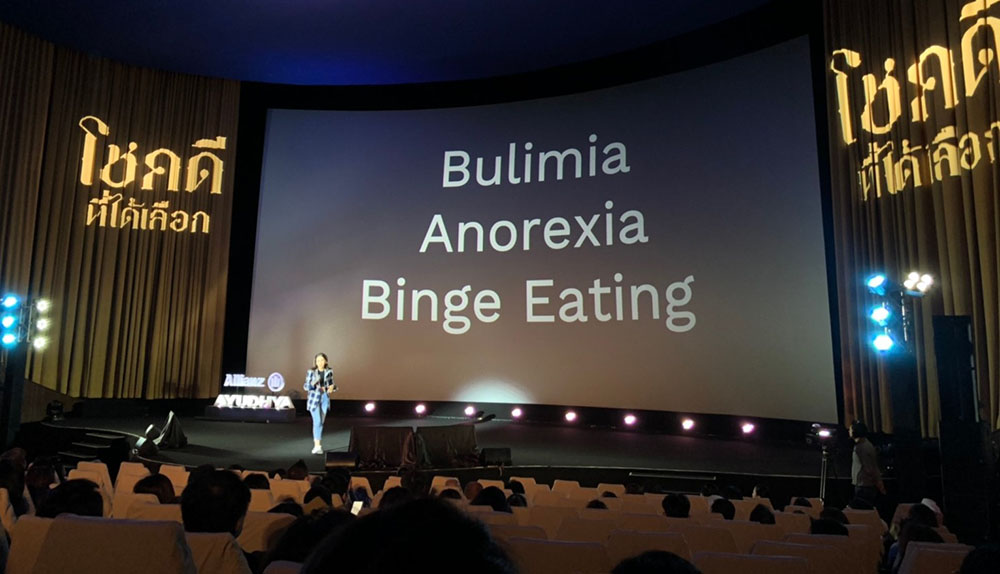
Singer and Actress Earn Kalyakorn
Ms. Kalyakorn, a talented singer and actress whose name many of our older readers will recognize, stepped onstage to share her experiences with depression. She talked about her lowest moment, and her transformative journey back to feeling happy again.
‘Forcing’ herself to get treatment and trust the people around her, Ms. Kalyakorn says, was how she finally managed to escape from the spiral of depression and fully recover. She adds that the best way to help someone heal from depression is to listen to them without judgement. Though we feel as if we understand exactly what someone is going through, no two people have had the same life experiences.
“If you want to change your life and the world, you have to begin with changing your own life first,” she says.
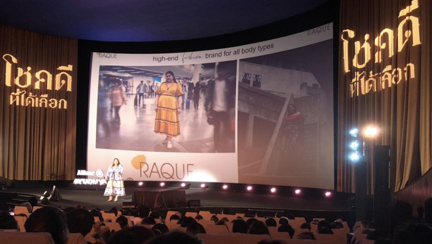
Writer and Translator Donporn (Tap) Rujirawong
American author Sallie Tisdale’s “Advice for Future Corpses: A Practical Perspective on Death and Dying” was written as a guide to ways of approaching death for readers interested in the idea of ‘peaceful death’. The book was skillfully translated into Thai by Ms. Rujirawong, who had three encounters with death, through the passing of loved ones, during the translation process. The sum of her life experiences have led her to realize that “death is indeed scary, but what is scarier than death is the fear of death itself.”
Prof. Dr. Isarang Nuchprayoon, Founder of the Yuen Yen (Evening Visits) Organization
As someone with extensive experience of treating children with cancer, Dr. Isarang Nuchprayoon is well aware some patients can fully recover from cancer. However, in other cases (such as metastatic cancers), a full recovery isn’t possible and what becomes most important in the treatment process isn’t to cure, but an approach known as palliative care: ensuring the patient lives the rest of their life as meaningfully as possible.
At present, Dr. Nuchprayoon provides consultations on palliative care from his home to patients new and old. He can be reached at 0807766712 or Line ID: yyen2018
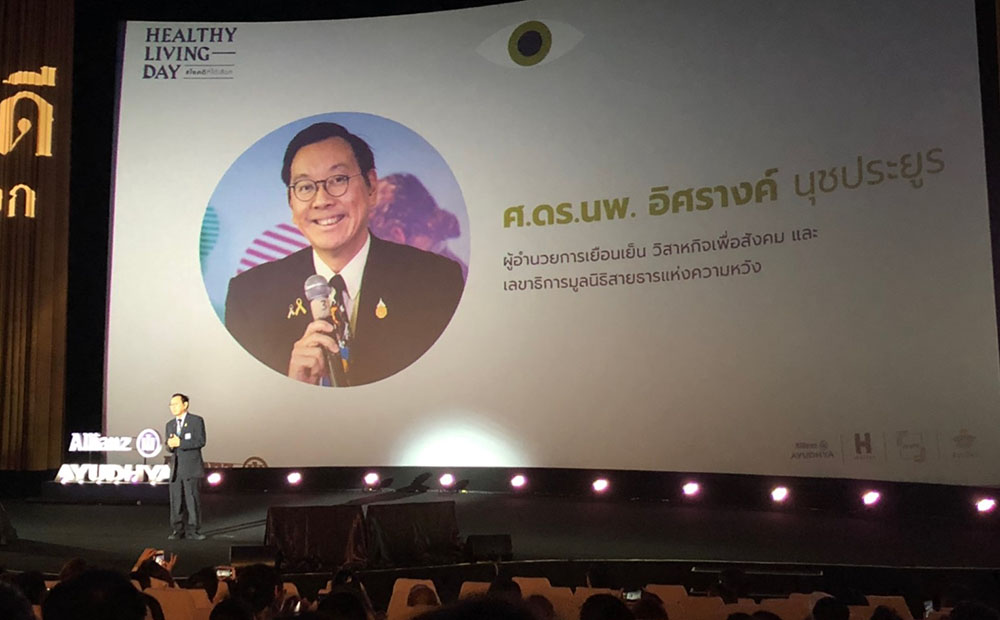
Organised by the Johjai TV show, the “Dying Peacefully” section unfolded under the direction of Doo Sanya, in the company of writers Wongthanong Chainarongsing, Sarawut “Niwglom” (“Roundfinger”) Hengsawad and Auntie Jumnongsri Hanjenlak, the president of the Cheevamitr Social Enterprise (in attendance as the conference’s special guest).
Highlights from the “Dying Peacefully” Section
Ae Sarawut “Niwglom” (“Roundfinger”) Hengsawad
Mr. Niwglom’s perspective on death is that it is bound to life, and is the driving force that compels us to live our lives more fully. The more time we spend ruminating on death, the stronger our will to live becomes. He illustrates this with a personal experience which led him to contend with loss and death: the death of his dog, a Thai Bangkaew, and companion of 15 years.
“It was the morning and I’d just woken up at home. Then, my sister called for me. When I went to her I found that the dog that had been my companion of many years had taken its last breath. When I touched it, there was nothing left of the warmth and pain that had once been in its living body. Before me was but the cold and emptiness. In a short interval of time, one thing had changed into another. I’d never really thought about this before.”
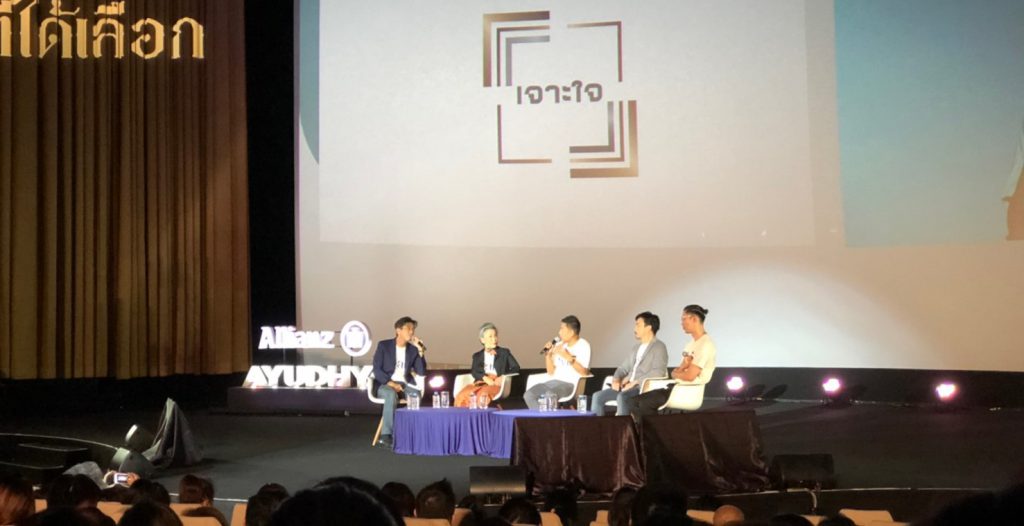
The close encounter with death became the catalyst that led Mr. Niwglom to plan and attend his own funeral at Wat That Thong with the support of Peaceful Death. As he reflected on the experience, Mr. Niwglom shares that he invited acquaintances, close friends, respected relatives and loved ones and asked them to eulogize him. The experience “brought him to tears”, as he came to the realization that “we should tell our loved ones how much they mean to us while they are still living, because it becomes meaningless to do so once they have passed away.”
Auntie Jumnongsri Hanjenlak
“Death has been part of my life for as long as I remember,” Ms. Hanjelak responds with a smile when asked about her perspective on death. Losing her mother when she was only 8 years old taught Ms. Hanjelak that death affects the people “left behind”, not those who have passed away. She had to adapt to growing up without her mother, unlike most people.
“In fact, it’s not the actual event of loss that scares us,” Ms. Hanjelak continues. What we truly fear is the loss of relationships, knowledge and control. She invites the audience to imagine themselves in this hypothetical scenario: you have lost your way and arrived at a place where you know no one, no one there knows who you are or where you have come from, and you haven’t got a single baht on you (you are without the ability to control your situation). She then asks whether or not they would be terrified. She says the same is true of death: no one knows beforehand what death will be like because none who have left have returned to tell us.
Wongthanong (Nong) Chainarongsing
Mr. Chainarongsing shared the results of a survey in which participants were asked how they would spend their time if they knew they only had seven more days to live. More than 90% concurred that they would “want to spend that time with their loved ones”, which is diametrically opposed to the way that most of us live our lives in this day and age.
Mr. Chainarongsing also used to live his life in contradiction with what truly matters in his life, devoting all of his time to work. That is, until his father was hospitalized.
“I remember my brother calling me, saying ‘Nong, get to the hospital as quickly as you can. The doctor says you should come see your father’. On the drive to the hospital, memories of me and my father piled up one after another. They were all good memories of us together, despite the fact that I hadn’t spoken to him in many years.”
Luckily, once Mr. Chainarongsing reached the hospital, his father had miraculously recovered from his critical condition. From that day onwards, Mr. Chainarongsing realized that we neglect those we love and instead give value to trivial things in our day to day lives. In the end, all we want is to spend the time we have with our loved ones as meaningfully as possible.
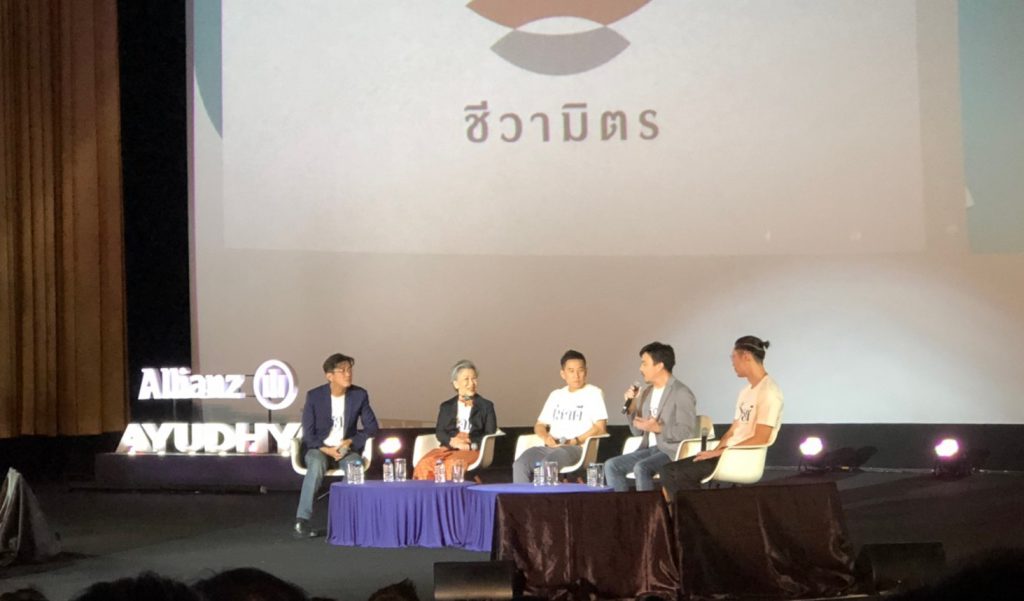
Oui Buddha Bless
The essence of Mr. Oui’s time onstage can be encapsulated in the observation that moving round and round the circuit of life is always scary, for we never know when death will intercept us. He elaborates:
“It is always a good thing to have conferences like these (in which we reckon on death and dying), because we recommit to live our lives afterwards in a meaningful way. But once we go home and return to our familiar routines, we eventually forget the epiphanies we had and find ourselves back on the same old circuit of our lives.” So, these existential moments of clarity are very special.
On the subject of reckoning with death, Mr. Niwglom adds, “I’ve asked Phra Paisal Visalo about it before. He said that an awareness of death can arise at many moments in life. For example, we may find ourselves thinking about death before boarding an airplane.”


